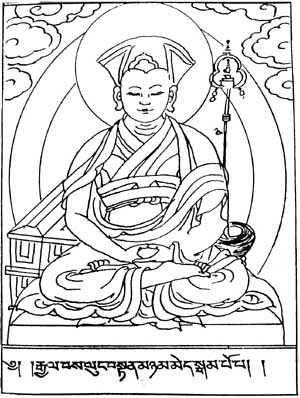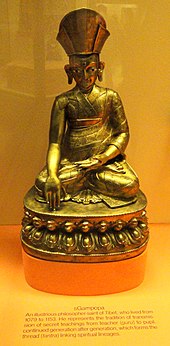Gampopa
Gampopa Sönam Rinchen (Tib. སྒམ་པོ་པ་བསོད་ནམས་རིན་ཆེན་, Wyl. sgam po pa bsod nams rin chen) (1079-1153/9) is regarded as the patriarch of the Kagyu school of Tibetan Buddhism.
Gampopa was born in Eastern Tibet, where he first trained as a physician and began a family. At the age of 26, after his wife and two children died in an epidemic, he ordained as a monk. After studying and practising the Kadampa teachings for a period of time, at the age of 32 he met Jetsün Milarepa, with whom he studied the Mahamudra teachings. Gampopa became one of the foremost disciples of Milarepa.
Gampopa's renowned text, The Jewel Ornament of Liberation, synthesized the two traditions of the Kadampa and the Mahamudra.
Short biography
Contemporary translator Ken Holmes writes:
Gampopa, also known as Dakpo Rinpoché, was born in 1079 in the Dakpo district of central Tibet. He originally trained as a physician, hence the other common title he is known by, Dakpo Lhajé (“Doctor of Dakpo”). He began his adult life as a married layman and only began intensive religious practice after experiencing the shock of the sudden deaths first of his chil- dren and then of his beloved wife when he was still in his early twenties. After extensive studies in other traditions, he eventually became a foremost disciple of Jetsun Milarepa (1040–1123).[1]
Prior to studying under Milarepa, Gampopa had studied the Kadam school, which is a gradual path based on the lamrim teachings. He eventually met Milarepa and attained realization of ultimate reality under his guidance. Gampopa was renowned for the clarity of his perception and his knowledge of both Kadam and Mahamudra methods.
Gampopa wrote The Jewel Ornament of Liberation (Wylie: dam chos yid bzhin nor bu thar pa rin po che'i rgyan), in which he synthesized the two traditions of Kadampa and Mahamudra. This text has become core text of the Kagyu tradition.
Lineage
Gampopa's position in the transmission lineage of the Mahamudra teaching is as follows:
- Tilopa (988-1069), the Indian yogi who experienced the original transmission of the Mahamudra
- Naropa (1016–1100), who perfected the methods of accelerated enlightenment described in his Six Yogas of Naropa.
- Marpa (1012–1097), the first Tibetan in the lineage, who translated the Vajrayana and Mahamudra texts into Old Tibetan
- Milarepa (1052–1135), poet and master who overcame Marpa's reluctance to teach but nonetheless attained enlightenment in a single lifetime
- Gampopa, Milarepa's most important student, who integrated Atiśa's Kadam teachings and Tilopa's Mahamudra teaching to establish the Kagyü lineage
This lineage sequence, taken together, is called the "Five Founding Masters" by the Kagyüpa.
Disciples
Four of Gampopa's disciples founded the four "major" Kagyu schools:
- Barom Kagyu founded by Barompa Darma Wangchug (1127-1194?)[2][3]
- Phagdru Kagyu founded by Phagmo Drupa Dorje Gyalpo (1110-1170)[2][4]
- Karma Kagyu, founded by Düsum Khyenpa, 1st Karmapa Lama (1110-1193)[2][5]
- Tsalpa Kagyu founded by Zhang Yudragpa Tsondru Drag (1123-1193)[2][6]
The succession of Gampopa's own monastery passed to his nephew, Dakgom Tsültrim Nyingpo (Wylie: dwags sgom tshul khrims snying po, 1116-1169).
Names and titles
Gampopa was known by the following names:
- Gampopa "the man from Gampo" (Tibetan: སྒམ་པོ་པ་)
- Sönam Rinchen (Tibetan: བསོད་ནམས་རིན་ཆེན་, Wylie: bsod nams rin chen),
He was also known by the following titles:
- Dakpo Rinpoche
- Dakpo Lharjé "the physician from Dakpo" (Tibetan: དྭགས་པོ་ལྷ་རྗེ་, Wylie: dwags po lha rje)
- Daö Zhönnu, "Candraprabhakumara" (Tibetan: ཟླ་འོད་ཞོན་ནུ་, Wylie: zla 'od gzhon nu)[7][8]
Longer biographies
For longer online biographies, see:
 Gampopa Sonam Rinchen (by Alexander Gardner), Treasury of Lives
Gampopa Sonam Rinchen (by Alexander Gardner), Treasury of Lives
 The Life of Gampopa, StudyBuddhism
The Life of Gampopa, StudyBuddhism
For book-length biographies, see:
- Jampa Mackenzie Stewart, The Life of Gampopa (Ithaca: Snow Lion Publications, 2004)
- Thrangu Rinpoche, Life and Teachings of Gampopa, Zhyisil Chokyi Ghatsal, 2003, ISBN 978-1877294303
Writings
Key texts
- Jewel Ornament of Liberation
- A Precious Garland of the Supreme Path (Tib. ལམ་མཆོག་རིན་ཆེན་ཕྲེང་བ་, Wyl. lam mchog rin chen phreng ba)
Collected works
Gampopa's collected works (known as the Dags po'i Bka' 'bum) were published in Dvag Lha Gampo monastery, but that edition has been lost. There are three main editions extant today: [9]
- An edition made in Remis Monastery, Ladhak, in the nineteenth century;
- A copy of the above, published in February 1982, in India;
- The Derge wood block edition.
See also
Notes
- ↑ Gampopa, Ornament of Precious Liberation, translated by Ken Holmes, Wisdom, 2017 (page 3)
- ↑ 2.0 2.1 2.2 2.3
 Gampopa Sonam Rinchen, Treasury of Lives
Gampopa Sonam Rinchen, Treasury of Lives
- ↑ Martin, Dan (August 2008). "Barompa Darma Wangchuk". The Treasury of Lives: Biographies of Himalayan Religious Masters. Retrieved 2013-08-18.
- ↑ Martin, Dan (August 2008). "Pakmodrupa Dorje Gyelpo". The Treasury of Lives: Biographies of Himalayan Religious Masters. Retrieved 2013-08-18.
- ↑ Gardner, Alexander (December 2009). "The First Karmapa, Dusum Khyenpa". The Treasury of Lives: Biographies of Himalayan Religious Masters. Retrieved 2013-08-18.
- ↑ Martin, Dan (August 2008). "Zhang Yudrakpa Tsondru Drakpa". The Treasury of Lives: Biographies of Himalayan Religious Masters. Retrieved 2013-08-18.
- ↑ Sgam-po-pa and Guenther, Herbert V. (trans). The Jewel Ornament of Liberation p. ix (Preface). Shambhala Publications (2001) ISBN 1-57062-614-6
- ↑ TBRC RID P1844
- ↑ Duff, Tony, Gampopa Teaches Essence Mahamudra, xi
Further Reading
- Jampa Mackenzie Stewart, The Life of Gampopa (Ithaca: Snow Lion Publications, 2004)
- Khenpo Karthar Rinpoche, The Instructions of Gampopa: A Precious Garland of the Supreme Path (Ithaca: Snow Lion Publications, 1996)
- Thrangu Rinpoche, Life and Teachings of Gampopa, Zhyisil Chokyi Ghatsal, 2003, ISBN 978-1877294303
- Ringu Tulku, Confusion Arises as Wisdom: Gampopa's Heart Advice, (Boston: Shambhala, 2012)
External links
 Gampopa Sonam Rinchen (by Alexander Gardner), Treasury of Lives
Gampopa Sonam Rinchen (by Alexander Gardner), Treasury of Lives
 sgam_po_pa_bsod_nams_rin_chen, Rangjung Yeshe Wiki
sgam_po_pa_bsod_nams_rin_chen, Rangjung Yeshe Wiki Gampopa Sönam Rinchen, Rigpa Shedra Wiki
Gampopa Sönam Rinchen, Rigpa Shedra Wiki The Life of Gampopa, StudyBuddhism
The Life of Gampopa, StudyBuddhism- Gampopa Life story (samye.org)
| This article includes content from Gampopa on Wikipedia (view authors). License under CC BY-SA 3.0. |


